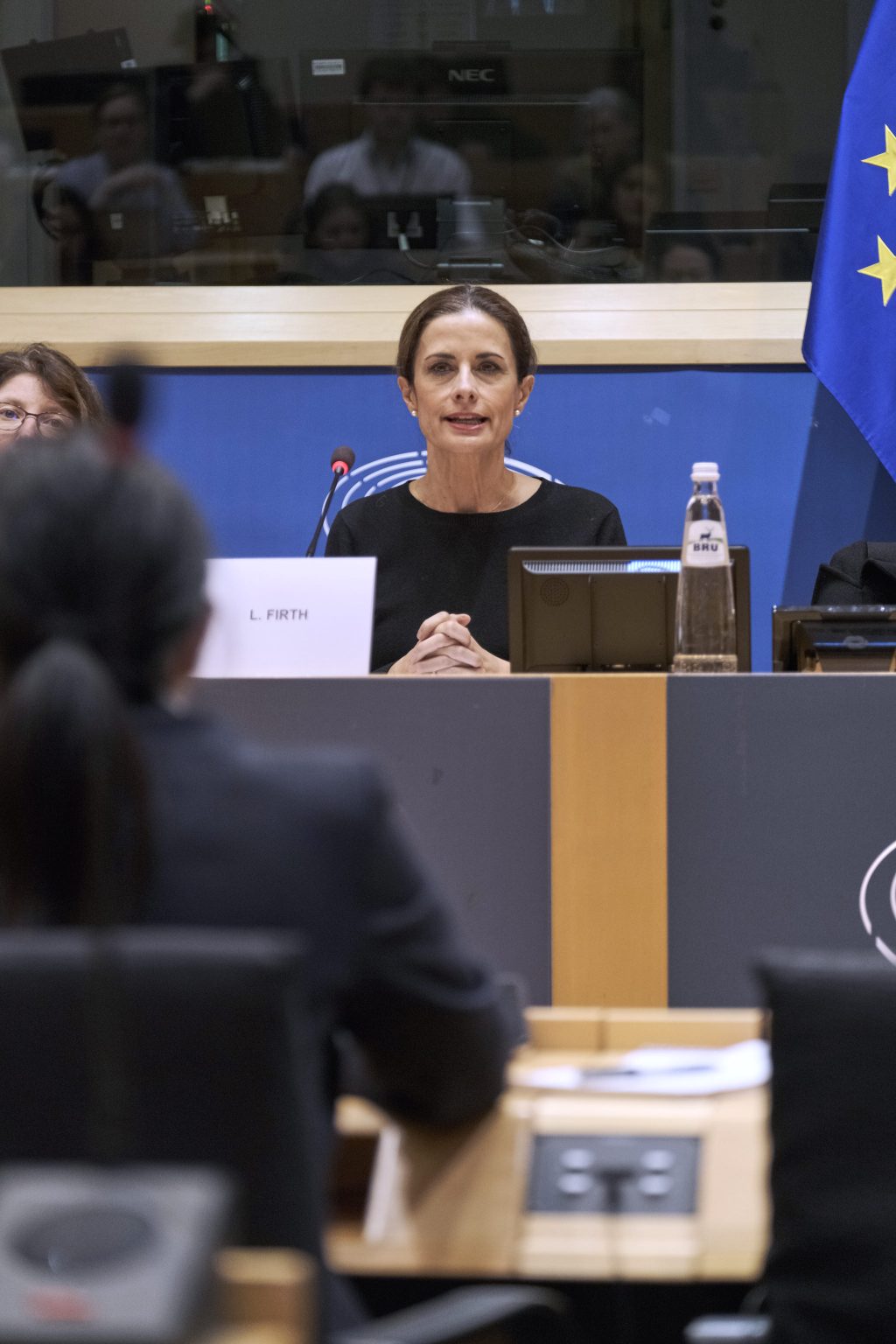Type Must Deal with Overconsumption, Says Panel at EU Parliament – WWD
PARIS — Simply forward of the outlet of COP28 in Dubai, legislators and activists headed to Brussels to each mark the walk and push for more potent law of the rage trade throughout the Ecu Union.
A panel dialogue titled “Fashionscapes of Transformation” hosted by means of MEP Alessandra Moretti introduced in combination policymakers, together with Ecu Commissioner for the Climate Virginijus Sinkevicius, Ecu Environment Bedrock well-known government officer Laurence Tubiana and Ecu Fee Directorate Common for Climate deputy head Paola Migliorini along host Livia Firth, founder of world sustainability consultancy Eco-Age.
“Having done this now for over 15 years, for me there’s only one thing — legislation, legislation, legislation,” Firth informed WWD in regards to the trade’s failure to self-regulate. For the entire discuss sustainable style, manufacturers have modest financial incentive to modify, she mentioned.
“The system is very sustainable — for the usual suspects, which have a vested interest in keeping the system as it is,” added Firth. “It’s important that we put in place rules that you need to comply [with]. Otherwise, nothing will change.”
That’s what the EU is doing with greater than 16 expenses — regulating the entirety from the design part to squander assortment and export, company reporting and microplastics — winding their means via its byzantine legislative procedure, all with the rage trade of their points of interest.
The regulations, all lately in several phases however anticipated to be in park by means of 2030, are supposed to paintings as an overarching suite of regulations underneath the EU’s Technique for Sustainable and Round Textiles.
Key parts of the Textiles Technique, such because the Eco-design for Sustainable Merchandise Law, are because of conclude negotiations sooner than the top of 2023, life alternative items will proceed in deliberations forward of the then Ecu elections in June 2024.
“They all depend on each other,” mentioned Firth of the way in which the rules must paintings in combination.
The trade statitics offered by means of the panel are stark: clothes manufacturing is accountable for roughly 8 p.c of world carbon emissions, in line with the United Countries Alliance for Sustainable Type.
Just about 6 million heaps of textiles are discarded each occasion within the EU, or about 25 kilos according to particular person, life only one p.c is recycled again into fresh merchandise, mentioned Sinkevicius. Textile intake has the fourth-largest affect at the atmosphere and situation trade within the EU, specifically aqua and land utility, he added.
In a wide-ranging dialogue, the panelists all touched on key issues which are intertwined within the style trade: overconsumption and manufacturing, insufficiency of colleague protections and truthful wages, fossil gasoline and plastic-based textiles and squander.
Sustainability Will have to Come with Staff’ Rights
Natalie Swan from the Trade and Human Rights Useful resource Centre inspired the EU to increase its definition of sustainability to incorporate the rage trade’s affect on employees and communities. The Company Sustainability Due Diligence Directive, which calls for firms to account for human rights of their provide chains, is within the negotiation procedure, anticipated to be concluded by means of 2024 and applied inside two years.
Garment employees are already feeling the bodily affects of situation trade, together with terminating climate such because the spillage in Pakistan extreme occasion which decimated the fibre gardens, inflicting process losses and financial ripples all the way through the rustic. They’re additionally coping with warmth pressure, as they will have to paintings with sizzling equipment even all over terminating climate occasions.
Staff continuously can not find the money for condition support, are requested to pay for their very own protecting apparatus and are confronted with low wages as manufacturers building up their margins. Low wages are “baked into the fashion business model,” she mentioned.
Swan added that the EU can utility its legislative leverage to modify the trade for the 300 million garment employees around the globe, 80 p.c of that are girls.
The Ecu Fee’s Migliorini famous that the proposed regulations will give international locations “more power, more resources to strengthen their market surveillance mechanisms” that walk past EU borders.
The place the EU’s Misspend Is going within the World South
Yayra Agbofah, Ghanaian activist and founding father of nonprofit group The Revival, known as at the EU to forbid clothes exports which are dumped within the World South. He famous that on Nov. 17, the EU affirmative on a trade in to forbid delivery recyclable plastic squander to non-OECD (Group for Financial Cooperation and Building) international locations, however the fresh regulations don’t come with clothes and textiles sourced from fossil fuels and plastic.
Ghana unwanted receives 23 million pieces each moment classified as secondhand items; alternatively, maximum aren’t usable and in lieu develop mountains of squander.
“If you’re thinking about actions, you need to think about policy-driven actions that include Africa, that include places like Ghana, from the onset,” he mentioned. “It shouldn’t be on a boat, because we are at the receiving end of it.”
He mentioned regulation must be twofold: banning particular pieces in addition to supporting recycling amenities at the farmland in international locations like Ghana.
Firth famous that the lengthy arm of the EU regulation impacts the World South. “When you legislate in Brussels as a privileged person in the Global North, where we consume the fashion, you have to remember that you are legislating for the person in Kenya, Ghana, Bangladesh and they are part of it,” she mentioned.
Nourishing Certifications With Assistance
Matteo Ward, host of Sky TV form “Junk,” which seems to be on the attire trade’s environmental results, mentioned his investigations into style provide chains. He addressed the economics of constructing ecological alternatives, emphasizing that as style seeks to reform its provide chains, it has to deal with wages and bills to manufacturers.
Environmentally destructive practices are financial at their root, and that employees he spoke with have been prepared to produce rejected environmental tradeoffs because of dire financial cases.
“Merchandising practices force the very low wages of these people, because the cost of the product has to stay so low that the economic conditions do not support an ecological transition,” he mentioned.
He cited the instance of operating in Indonesia, which cuts roughly 300 million bushes according to occasion to manufacture viscose. “The industry needs that [natural] capital as a source of revenue…for what is transformed into garments that are worn a couple of times and then trashed,” he mentioned.
He witnessed old-growth woodlands being scale down and famous that many of those bushes have been being despatched out qualified as sustainable. “Brands were paying to say the sources of their pulp to create artificial fibers was ethically made, responsibly sourced, but in reality these certifications are false,” he alleged, issued by means of financially determined employees.
His 2nd instance was once of qualified factories in Bangladesh that he mentioned weren’t the use of their filtering apparatus sooner than dumping dye squander as a result of they may no longer find the money for to run it.
Ward added that life the trade is making an attempt to take on problems with era, it’s a Band-Help at perfect. “We cannot recycle ourselves out of these problems,” he mentioned. Alternatively, he identified that style shapes concepts and tradition and known as on manufacturers to utility that energy for excellent.
“It’s an industry that can literally change behaviors,” he mentioned.
Manufacturers Want to Proceed Clear of Oil, Again Untouched Fabrics
Simon Giuliani, head of sustainability and technique of Candiani Denim, mentioned the corporate created a bio-based elastane known as Coreva which supplies denims stretch, however not like oil-based synthetics is biodegrade and recyclable.
Alternatively, Giuliani mentioned that life manufacturers continuously discuss “next generation” textile answers, they don’t again that up with purchases of fresh or cutting edge merchandise because of worth power, and don’t wish to pay Ecu wages. Overproduction is the basis motive, plus the associated fee to chase pennies on margins.
“Ever since supply has surpassed demand, price has become the main factor of the fashion industry,” he mentioned.
Seventy-seven p.c of the entire clothes bought in Europe isn’t produced throughout the bloc, he famous, in lieu the use of inexpensive hard work in other places. “Brands have to tap into low-cost supply chains in order to survive in the Western economy,” he mentioned.
Giuliani advocated for regulation that incentivizes firms to spend money on cutting edge fabrics, life Moretti famous that the proposed rules are designed to inspire fiber-to-fiber recycling.
Manufacturers Are Making Too A lot Stuff
Just about each panelist got here again to overproduction and intake. Core problems space from the environmental prices to the using i’m sick of wages. All the ones Dim Friday offers? Low costs “make people buy, and we have to deal with the waste,” mentioned Agbofah. Halloween costumes from slightly a generation in the past are already piling up on Ghana’s shores, he mentioned.
“When activists or environmentalists point to the ecological nightmare that is today’s pace at which we produce and consume, brands largely respond by greenwashing and calming our worries. We’re told there is no need to slow down runaway consumption because the circular economy will save us all,” added Firth.
Migliorini famous that life the EU has curbed greenwashing during the Inexperienced Claims Initiative, it can not prevent promoting or alter these kind of promotions, however known as on manufacturers to have higher practices.
Sinkevicius famous that life the cost of garments has reduced according to merchandise, families are spending extra on clothes at the same time as the price of residing catastrophe bites. “The problem that we are facing here is a consumption problem,” he mentioned.
“We need to remind ourselves that a lot of these brands’ economic value is bigger than some countries’ GDP. So when we talk about governments, we need to make sure that governments are not falling into the pressure of these brands and companies,” added Moretti.
Embargoed Oil Ends Up on Major Boulevard
Talking from the target market, Urksa Trunk from the Converting Markets Bedrock addressed how embargoed oil from Russia following its invasion of Ukraine is making its solution to Major Boulevard shops via Bharat. That nation does no longer have any sanctions towards Russia, and has been purchasing up discounted oil.
Indian polyester manufacturer Reliance assets oil from Russia, and higher its tide into the provision chain following the invasion of Ukraine in February 2022, in line with import information defined within the file. Trunk famous that Converting Markets alleges 39 world style manufacturers manufacture with polyester produced from Russian oil. Asos, Marks & Spencer, H&M, Hugo Boss, Mango, Nike, Goal and Zalando are a few of the manufacturers that not directly supply from Reliance, the file mentioned.
Heading Into COP28
With COP28’s president Sultan Al Jaber additionally serving as well-known government officer of the United Arab Emirates’ climate oil company, there was a lot skepticism state this occasion’s host nation, its environmental monitor file and its schedule. Nonetheless, it’s noteceable to stick i’m busy, mentioned Firth.
Talking about COP, Firth mentioned that style has traditionally been disregarded, however as an trade touches on many key environmental and emissions problems together with agriculture, deforestation and utility of fossil fuels. “We wear oil every day,” she mentioned, noting that many materials — together with the ever present polyester — are produced from oil and the rage trade is constantly expanding its utility of polyester.
The continued building up in manufacturing quantity offsets any walk in potency or fabrics and is pushing style time the goals i’m ready by means of the Paris Commitment to restrict world heating to two.7 levels Fahrenheit, added Firth.
“It’s easy to feel discouraged about COP,” mentioned Firth. “Fashion has always been a very interesting advocacy tool, because people wear it every day. You see that these issues are so huge, but when you bring them back to what you’re wearing, it’s more digestible. It’s our responsibility to remind people.”
Tubiana was once the important thing architect of the Paris Commitment at COP21 in 2015.
“We need to be vigilant that emissions don’t move elsewhere because the fossil fuel industry sees fashion as a growth sector. The fashion industry has a key role of cutting [off] another flow of demand from this sector, as we try to do on the transport sector, on heating and cooling. This will be a key debate in Dubai,” Tubiana mentioned. “It’s an important political moment.”
On Oct. 16, the EU member states unanimously followed the objective to hunt a world phase-out of fossil fuels as its authentic place at COP28. The EU panel was once held simply forward of the convention opening Thursday to “make sure that it is understood by the MEPs that work on textile strategy that they are a fundamental part of this,” added Firth.






Leave feedback about this